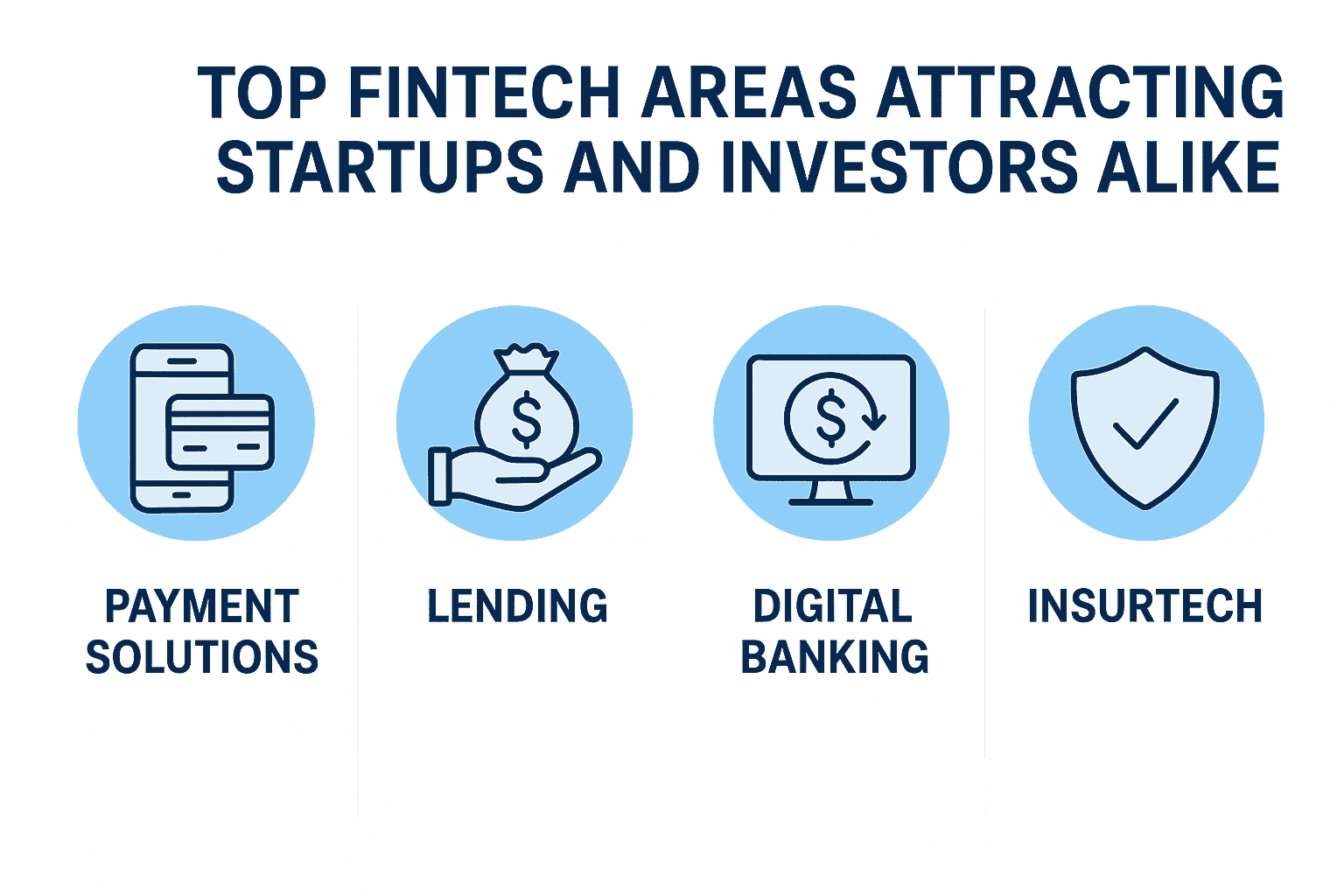Top Fintech Areas Attracting Startups and Investors Alike
From being a disruptive newcomer, the financial technology industry, or fintech, has developed into one of the most alluring sectors for startups and international investors. Fintech, which was formerly regarded as a specialized sector, is now the backbone of contemporary economies, revolutionizing how people save, borrow, invest, insure, and even make payments. It offers entrepreneurs a plethora of chances to create cutting-edge goods. It promises robust returns and rapid growth for investors. Fintech also makes it possible for businesses like Dinoustech, a reputable partner in digital innovation, to collaborate on projects that push the boundaries of technology.
What are the most popular fintech fields right now, and why do they still draw billions of dollars in funding? Let us examine in detail the fintech industries propelling global expansion.
Payments and Digital Wallets
The digital payments ecosystem is at the core of fintech. Payments are now the most heavily funded fintech sector due to the global boom in e-commerce and mobile-first economies. Peer-to-peer payment systems and digital wallets are becoming widely used in a variety of markets, from developed countries with advanced banking systems to emerging ones where mobile payments are surpassing traditional banking.
This industry is attractive to investors due to its extreme scalability. An app for a digital wallet may begin with a small set of features, such as bill payment, money transfers, and QR code scanning, and then develop into a super-app that provides credit, insurance, and even investments. High recurring revenues and customer stickiness are guaranteed by the ability to record millions of transactions every day. This is a fertile ground for startups due to the low barrier to entry and high user demand.
With the help of technologies like contactless payments, near-field communication, and biometric authentication, payments are anticipated to develop into smooth, undetectable layers of commerce in the future. Startups with solid user experience and security foundations will always attract investor interest thanks to the competition to dominate this market.
👉 Also Read: - The Future of Fintech App Development: Trends to Watch in 2025
Digital Lending and Alternative Credit
Digital lending is another rapidly expanding fintech sector. Conventional lending procedures are cumbersome, slow, and frequently exclude significant segments of the population. Fintech companies are addressing this by using automation, alternative data, and AI-driven credit scoring to offer quick loans. By empowering underbanked populations and gaining access to multitrillion-dollar lending markets, this offers both social and financial appeal.
Lending startups that focus on buy-now-pay-later (BNPL) products, SME financing, or personal loans are seeing a surge in investment. In recent years, BNPL has skyrocketed, attracting younger customers looking for flexible payment plans. Building strong risk management and compliance frameworks is crucial for entrepreneurs because lending is subject to regulatory scrutiny. However, the benefits—consistent interest income and chances for cross-selling—make it a very profitable industry.
Digital lending will continue to develop into quicker, more inclusive models as open banking and real-time data sharing gain traction. This continues to be one of the top draws for startups and international investors due to the combination of technology and finance.
WealthTech and Robo-Advisory
Fintech has democratized wealth management, which was previously only available to wealthy people. Millions of users around the world are drawn to WealthTech solutions, which include micro investing platforms and robo-advisors. Because of its low operating costs and subscription-based revenue models, investors view this industry as especially promising.
Robo-advisors offer individualized asset allocation, portfolio management, and investment recommendations using algorithms and machine learning. It is revolutionary that they can cater to mass markets without needing a sizable staff of financial advisors. Younger demographics are also being attracted to startups that provide automated savings, fractional share investing, and cryptocurrency-based investments.
From the standpoint of an investor, WealthTech services' recurring nature guarantees steady growth. Combining education and accessibility to help users better understand financial markets and make investments presents an opportunity for startups.
👉 Must Read: - Cost to Create an App Like Paytm for Digital Payments & UPI
InsurTech
Fintech companies in the InsurTech sector are tackling the numerous inefficiencies in the insurance sector, which is another sector ready for disruption. Insurtech platforms are simplifying once-difficult processes, from facilitating real-time claims processing to making policy purchases easier. The industry is changing due to add-ons like wearables for health coverage, telematics for auto insurance, and artificial intelligence (AI) for fraud detection.
Why are investors excited about this? Despite being a significant source of income worldwide, insurance premiums are still not widely used in many markets. Startups can reduce costs and reach underserved populations by utilizing technology. For instance, Gen Z and millennials, who value flexibility over traditional long-term policies, are especially drawn to usage-based or on-demand insurance products.
Startups that can provide transparency and streamline regulations stand to gain both users and funding. The convergence of automation, personalization, and big data guarantees that insurtech will continue to be a hub for investment and innovation.
RegTech
Concerns regarding security, compliance, and regulation are growing along with the use of fintech. With its solutions for risk management, fraud detection, identity verification, and anti-money laundering (AML), regulatory technology, or RegTech, has become a crucial subsector. To assist financial institutions in adhering to intricate international regulations, startups in this field are developing advanced AI and machine learning tools.
RegTech is both a need and an opportunity for investors. Strong compliance systems are essential for all financial service providers, including banks and fintech startups. Long-term stability and growth are ensured by the consistent demand for these services. Furthermore, the growing emphasis on data privacy regulations around the world guarantees that RegTech's significance will only increase.
Entrepreneurs who want to get into RegTech must have technical know-how and a thorough awareness of the regulatory environment. However, the reward is substantial: lucrative agreements with financial service providers, governments, and banks that place a premium on compliance.
👉 Also Read: - How Much Does It Cost to Develop a Fintech App in 2025?
Blockchain and Cryptocurrency
Without bringing up blockchain and cryptocurrencies, no discussion of fintech is complete. Although some investors may be put off by the volatility of cryptocurrency markets, blockchain technology has shown itself to be resilient. Startups are using decentralized systems for asset tokenization, smart contracts, and cross-border payments in addition to currencies.
Blockchain projects continue to attract venture capital because of their disruptive potential. Global markets respond favourably to the promise of quicker, less expensive, and more transparent transactions. In addition to cryptocurrency trading, other fields that are gaining interest include blockchain-based identity solutions, decentralized finance (DeFi), and non-fungible tokens (NFTs).
As governments around the world struggle with how to regulate digital assets, startups face the challenge of striking a balance between innovation and regulation. However, blockchain is still one of the most alluring and revolutionary fintech industries, and institutional adoption is growing.
Neobanks and Challenger Banks
Digital-only neobanks are posing a threat to traditional banks with their physical branches and antiquated systems. Through mobile apps, these fintech-driven companies provide services like budgeting tools, debit cards, and savings accounts. They are especially alluring due to their low operating costs and capacity to cater to niche markets.
Neobanks are viewed by investors as the retail banking of the future because of their capacity to draw in younger, tech-savvy customers. The emphasis is on providing excellent customer service in addition to low fees. Neobanks frequently create an ecosystem that keeps customers over time by integrating easily with lending services, investment tools, and payment platforms.
Targeting groups, such as students, gig workers, freelancers, or small enterprises, and customizing banking products to meet their requirements, presents an opportunity for startups. Neobanks have the potential to expand rapidly with sustained funding and regulatory support.
👉 Must Read: - Top 6 Fintech App Development Companies in India - 2025
Embedded Finance
The integration of financial services into non-financial platforms is known as embedded finance. Consider retail platforms that allow one-click payments, e-commerce websites that offer credit, or ride-hailing apps that provide insurance. Attracting both startups and investors, this trend has emerged as one of the fintech industries with the fastest rate of growth worldwide.
By integrating financial products into regular user experiences, embedded finance has the potential to monetize ecosystems. Startups can easily provide payment, lending, or insurance services by collaborating with merchants, healthcare platforms, or travel apps. This model's scalability, which capitalizes on the user bases of non-financial platforms, particularly appeals to investors.
Embedded finance will become more complex as APIs and open banking develop further, providing startups with countless opportunities for innovation.
AI and Data-Driven Fintech
The next generation of fintech solutions is being driven by artificial intelligence. AI is improving the speed and intelligence of financial services, from chatbots for customer support to predictive analytics for fraud detection. Because AI-driven fintech has the potential to be efficient and personalized, investors are especially optimistic about it.
AI is being used by startups to develop highly customized financial products, such as credit cards, loans, or investment recommendations that are specific to each person. Additionally, risk scoring models and fraud detection algorithms are boosting confidence in digital platforms. AI will remain a key component of fintech innovation as big data expands.
The difficulty for entrepreneurs is to prevent algorithmic bias and maintain transparency. However, those who do it correctly will influence the direction of finance in addition to gaining the trust of investors.
👉 Also Read: - Fintech App Development Guide: Costs, Features & Market Trends
Challenges and Opportunities
Although there are many opportunities in these fintech sectors, there are drawbacks as well, such as scalability problems, cybersecurity threats, regulatory barriers, and the requirement for constant innovation. However, the risks are greatly outweighed by the opportunities. Over the next ten years, global fintech revenues are predicted to increase at a double-digit compound annual growth rate (CAGR), making it one of the most promising industries for investors and startups alike.
Innovation, compliance, and customer-centric design are the keys to success for startups. Finding projects that strike a balance between long-term sustainability and disruption is crucial for investors.
Why Choosing the Right Technology Partner Matters
It is crucial to have the right technology partner as fintech becomes more complex. A fintech app development company that is knowledgeable about user experience, regulatory frameworks, and the newest technologies is essential for both startups and financial institutions. Additionally, they require a fintech software development firm that can create inventive, safe, and scalable solutions.
Here's where reliable partners like Dinoustech come in handy. Dinoustech's focus on innovation and extensive experience in custom app development enable them to assist both fintech startups and large corporations in turning their concepts into solid, marketable solutions. The correct partner guarantees a quicker time to market, cost effectiveness, and adherence to international standards for everything from blockchain-powered platforms to mobile banking apps.
Conclusion
Fintech is the financial industry's future, not just a trendy term. From blockchain and AI-driven platforms to digital payments and lending, the industry is still developing quickly, drawing in both investors with large sums of money and startups with innovative ideas. Fintech will continue to be one of the most innovative fields for years to come due to the wide range of opportunities and the magnitude of the global demand.
Now is the moment for entrepreneurs to take advantage of the opportunity and develop solutions that tackle pressing issues in the real world. In an increasingly digital world, fintech offers investors unrivalled potential returns. Additionally, the process from concept to execution is accelerated, streamlined, and enhanced with partners like Dinoustech Private Limited. Fintech will be the defining factor influencing the future of global economies as the lines between technology and finance continue to blur.

















